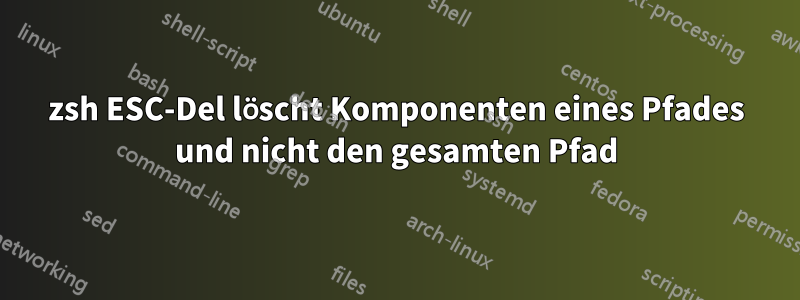
Ich wechsle von Bash zu Zsh. In Bash löscht Esc-Entf eine Komponente eines Pfadnamens; in Zsh löscht es den gesamten Pfadnamen.
Das heißt, wenn ich Folgendes eingegeben habe:
cat /usr/local/bin/foobar
und ich drückte ESC-ENTF. In Bash endete das Ergebnis mit:
cat /usr/local/bin
und mit zsh erhalte ich:
cat
und das ist nicht das, was ich will!
Wie ändere ich dieses Verhalten?
Antwort1
Ich benutze diese Funktion
function kill-path-word()
{
local words word spaces
zle set-mark-command # save current cursor position ("mark")
while [[ $LBUFFER[-1] == "/" ]] {
(( CURSOR -= 1 )) # consume all trailing slashes
}
words=("${(s:/:)LBUFFER/\~/_}") # split command line at "/" after "~" is replaced by "_" to prevent FILENAME EXPANSION messing things up
word=$words[-1] # this is the portion from cursor back to previous "/"
(( CURSOR -= $#word )) # then, jump to the previous "/"
zle exchange-point-and-mark # swap "mark" and "cursor"
zle kill-region # delete marked region
}
zle -N kill-path-word
Nun können Sie diese Funktion binden an zB ESC+Deldurch
bindkey "^[^[[3~" kill-path-word
Fügen Sie beide Snippets in Ihre ~/.zshrcDatei ein und starten Sie neuzshfoo/bar/baz////und sollte dann zu foo/bar/„upon“ gekürzt werden ESC+Del.
Wenn Sie auch den Trainingsschrägstrich entfernen möchten (wie in Ihrem Beispiel), fügen Sie while ...davor dieselbe Schleife hinzu zle exchange-point-and-mark.
Antwort2
Um die Antwort von mpy zu erweitern: Dies ist eine Version, die das letzte 'cat /usr' nicht komplett verbraucht, sondern '/usr' und dann 'cat' löscht. Sie teilt die Variable $LBUFFER durch einen regulären Ausdruck auf, der flexibler ist als ein einzelner Schrägstrich.
function kill-path-word()
{
local words word spaces
zle set-mark-command # save current cursor position ("mark")
words=($(grep -Eo '(/?[a-zA-Z1-9]+[\\ /]*)|([^a-zA-Z0-9])' <<< "$LBUFFER"))
word=$words[-1] # this is the portion from cursor back to previous "/"
while [[ $LBUFFER[-1] == " " ]] {
(( CURSOR -= 1 )) # consume all trailing spaces - they don't get into the $word variable
}
(( CURSOR -= $#word )) # then, jump to the previous "/"
zle exchange-point-and-mark # swap "mark" and "cursor"
zle kill-region # delete marked region
}
zle -N kill-path-word
bindkey "^[^?" kill-path-word


